Charles E W Bean, Diaries, AWM38 3DRL 606/277/1 - 1926-1939 - Part 5
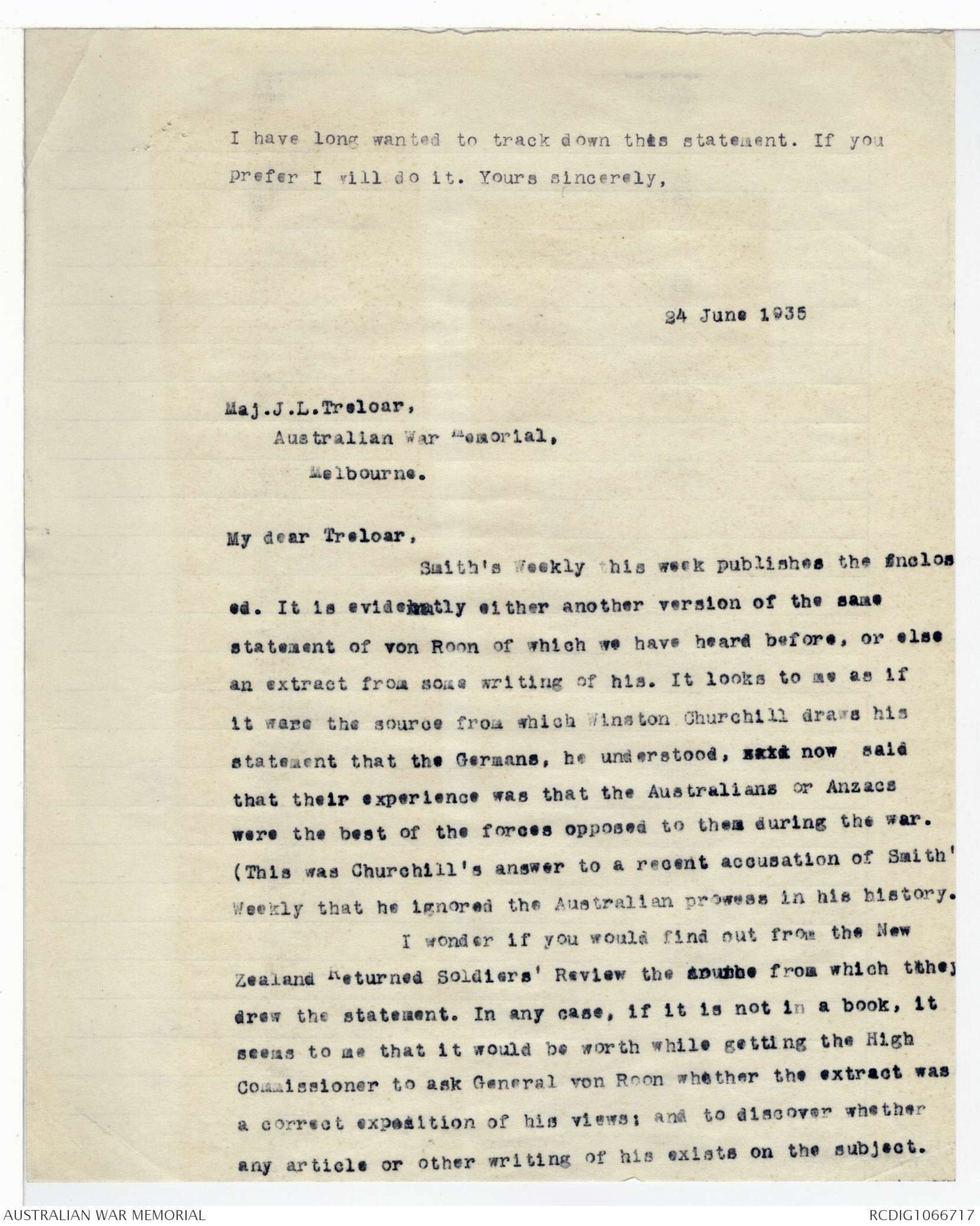
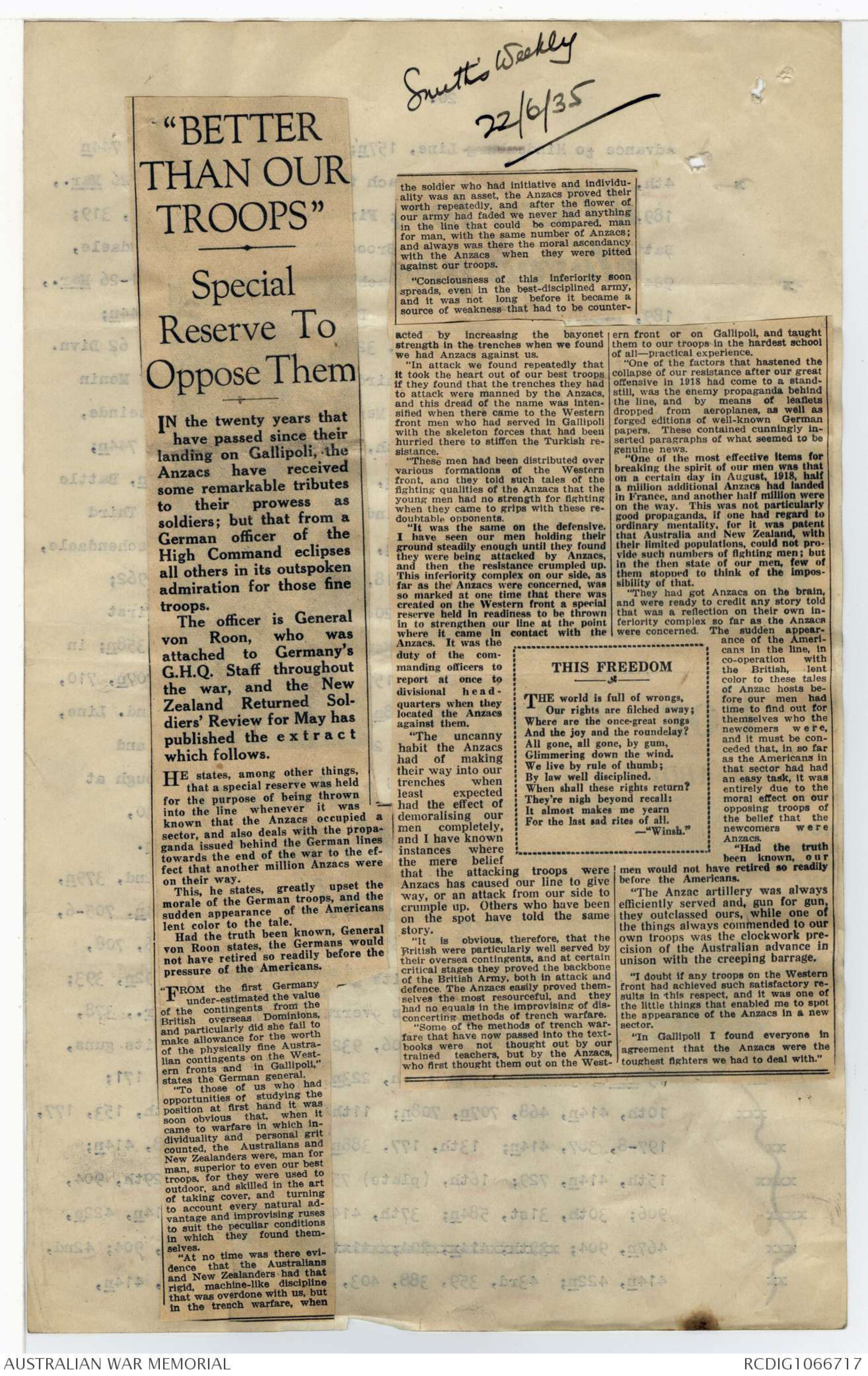
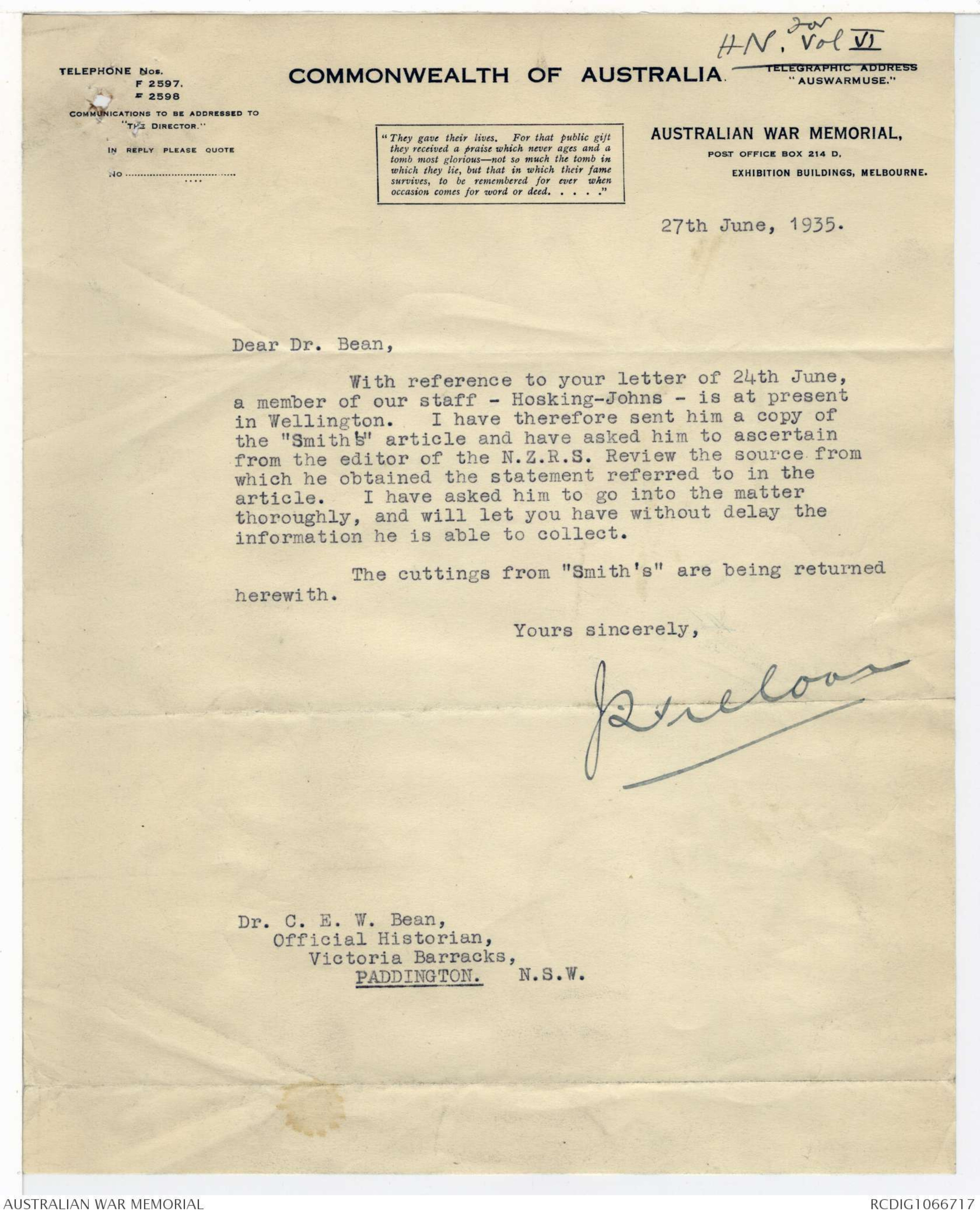
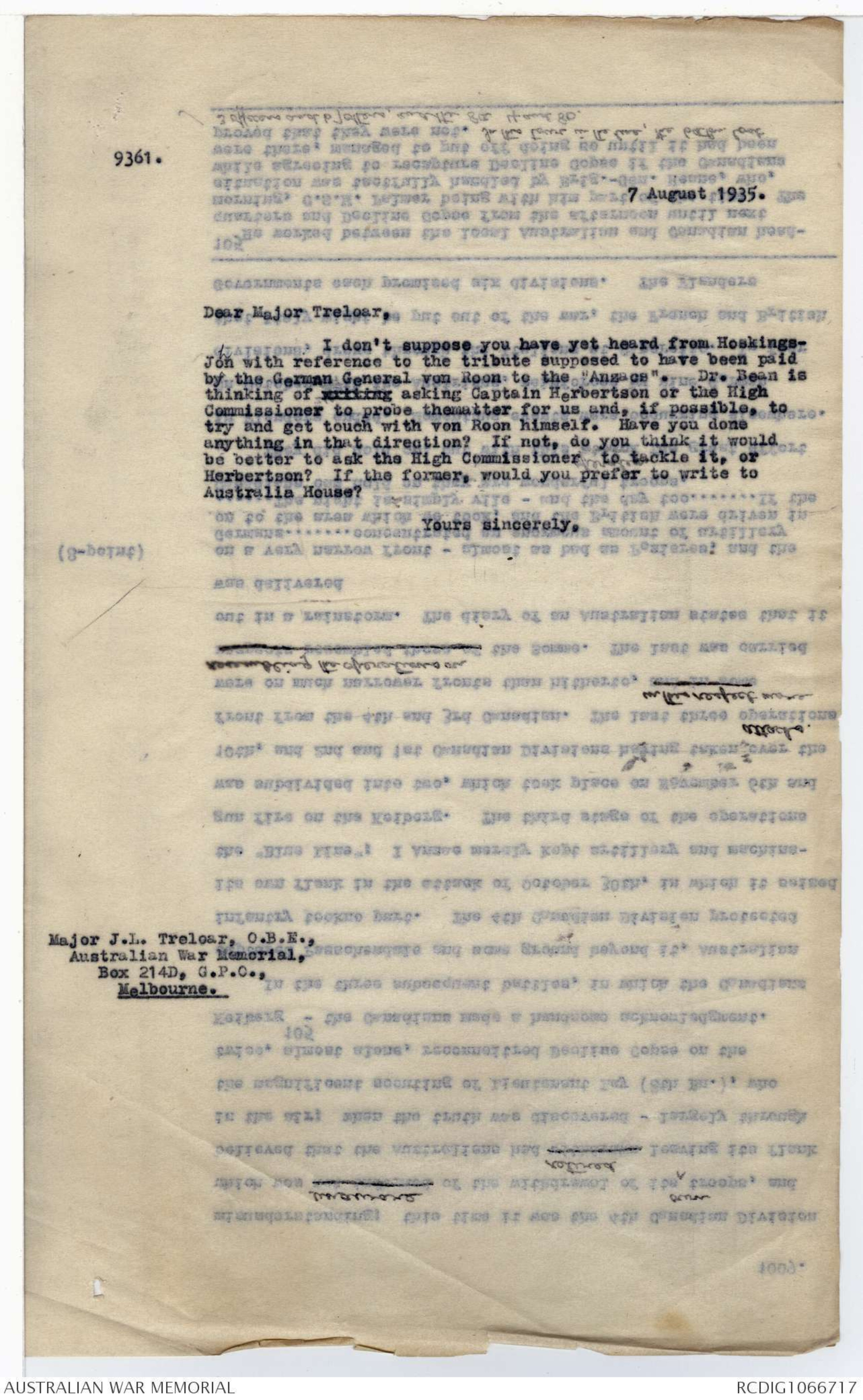
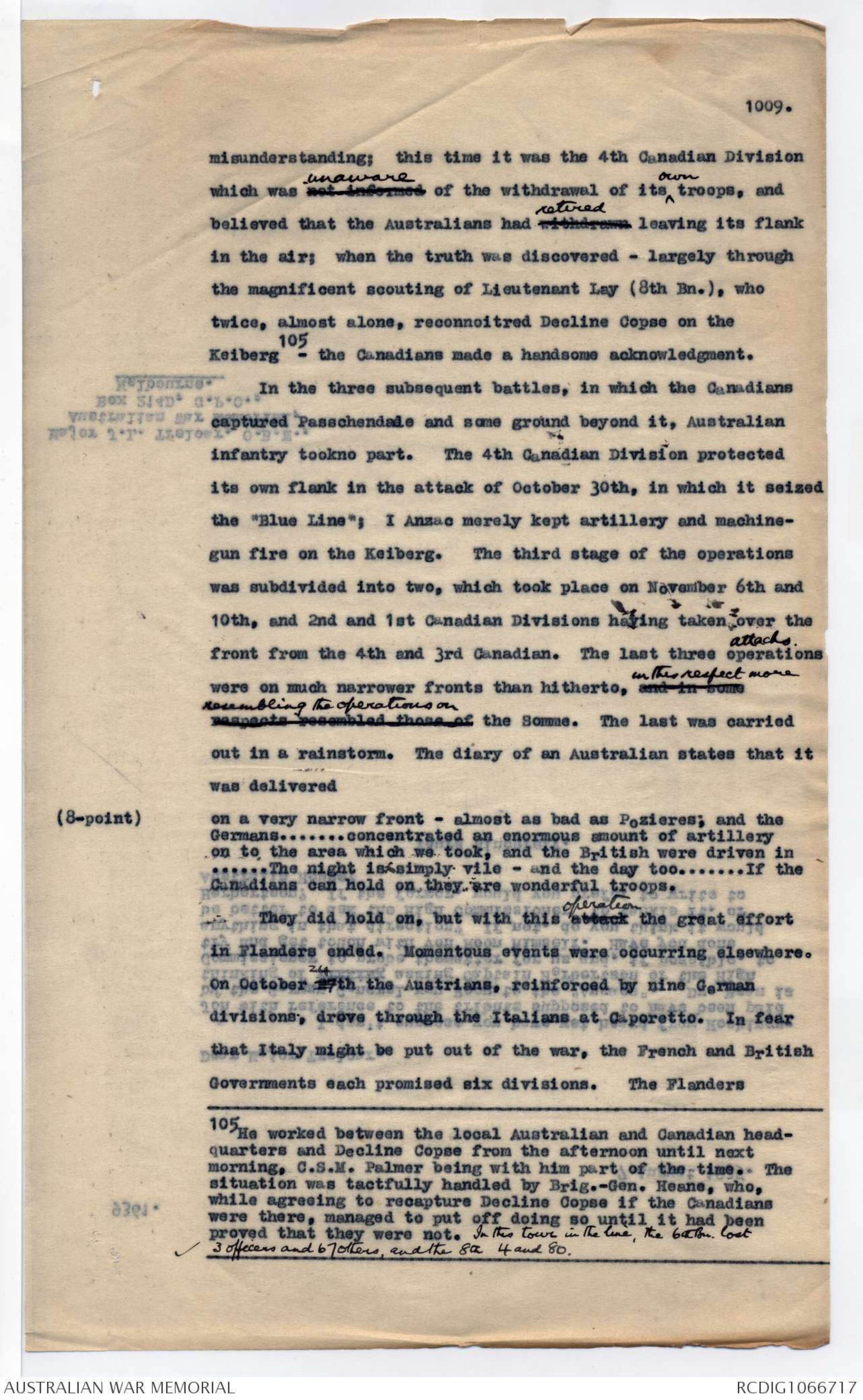
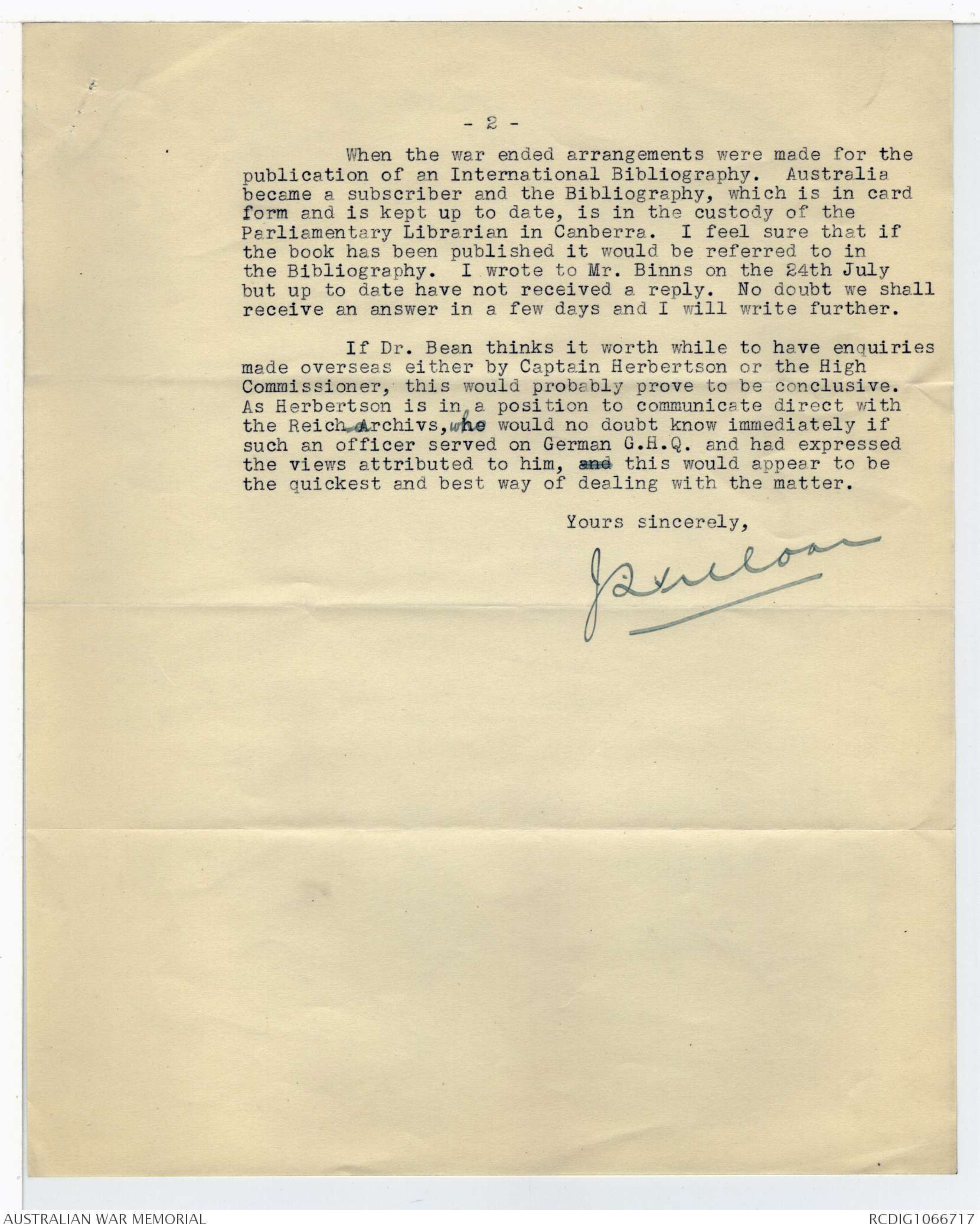
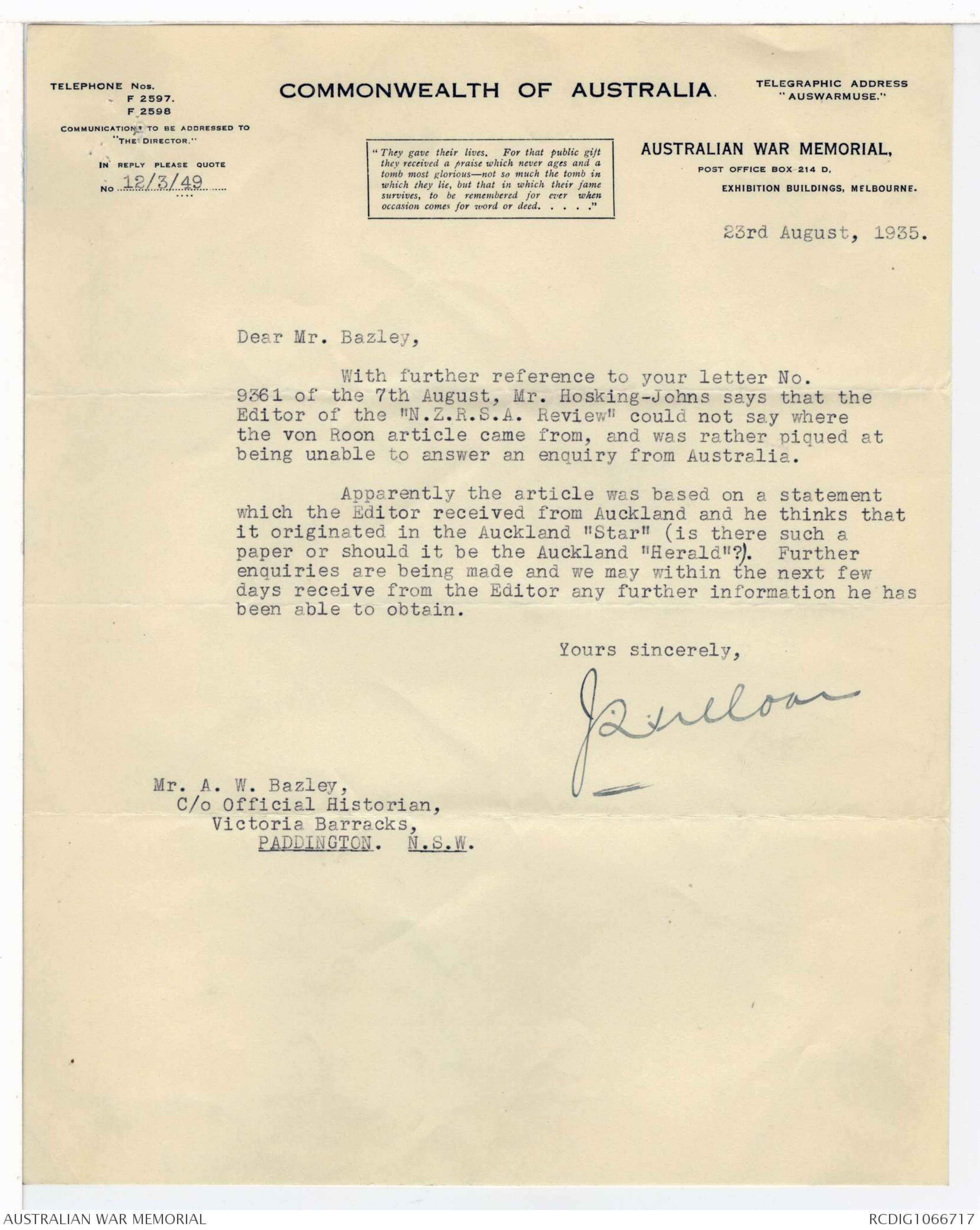
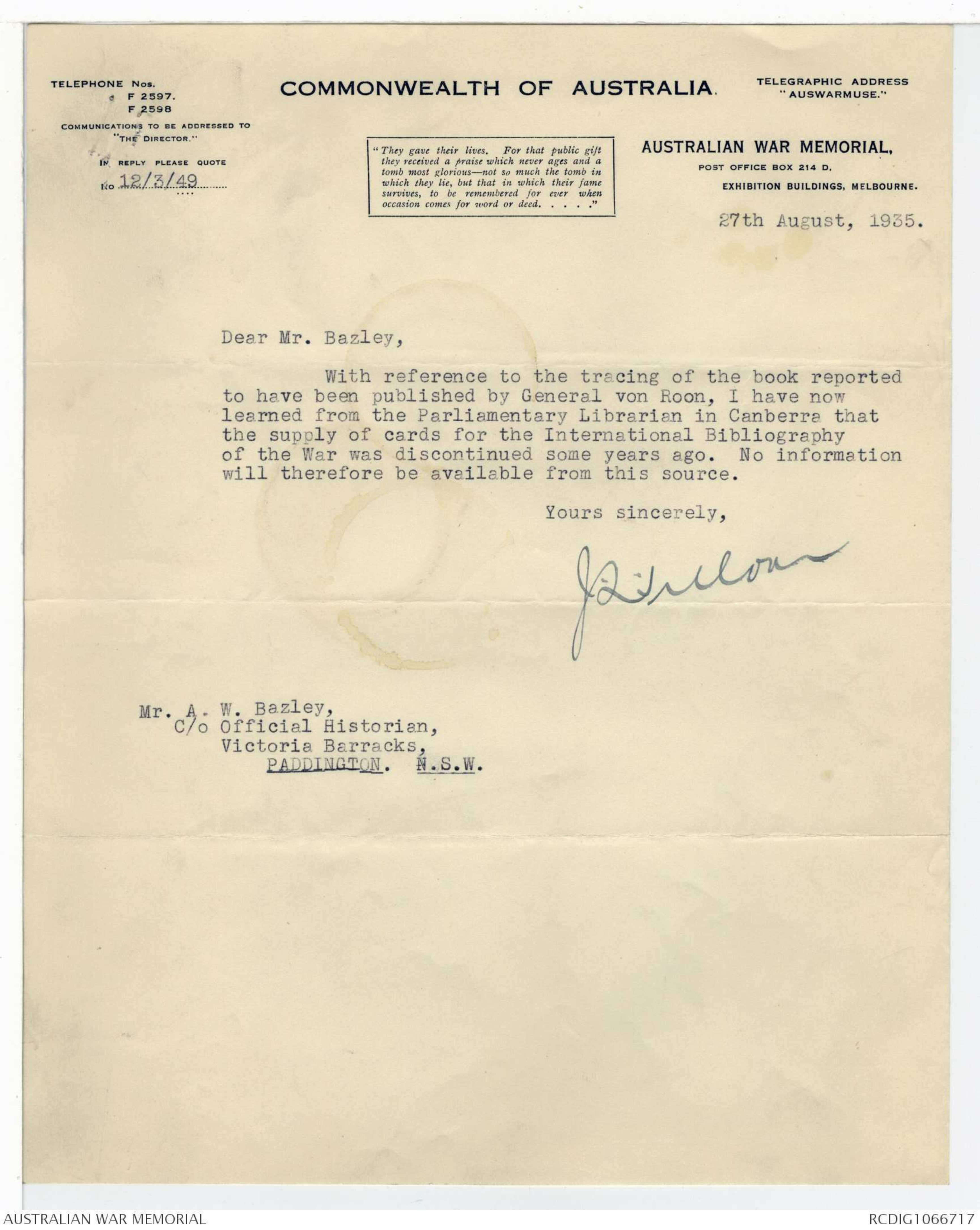
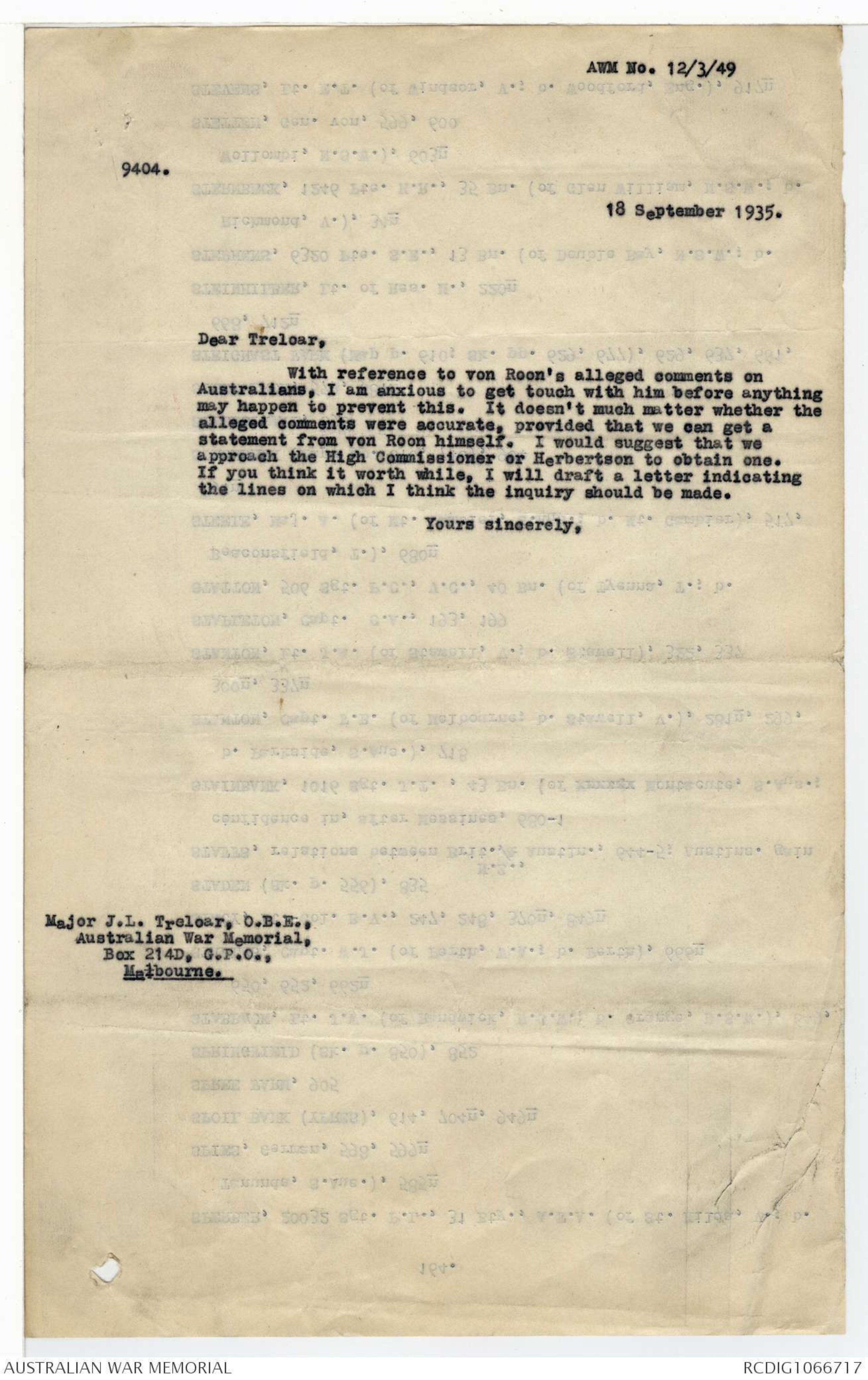
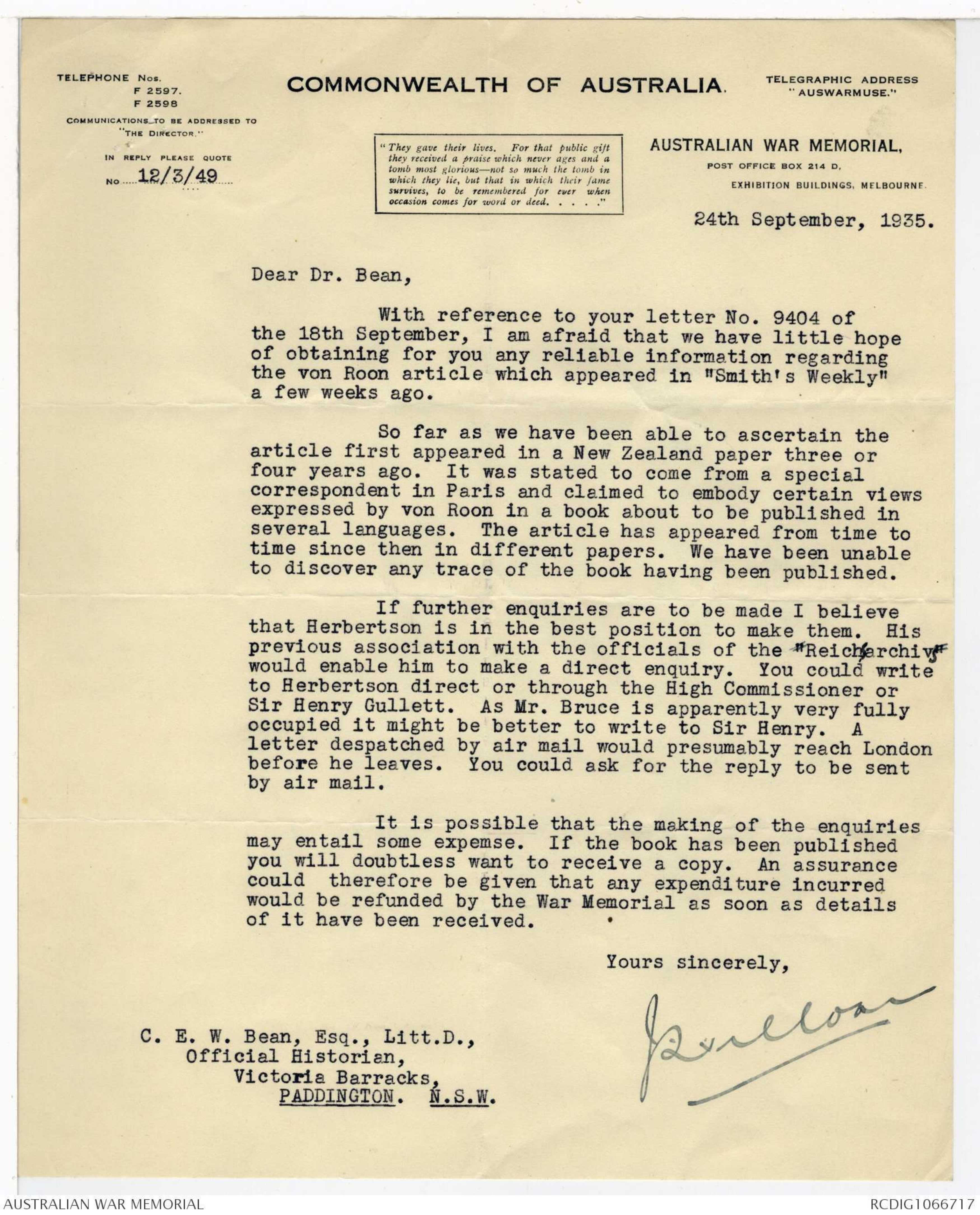
I have long wanted to track down this statement. If you
prefer I will do it. Yours sincerely.
24 June 1935
Maj. J.L.Treloar,
Australian War Memorial,
Melbourne.
My dear Treloar,
Smith's Weekly this week publishes the enclosed.
It is evidently either another version of the same
statement of von Roon of which we have heard before, or else
an extract from some writing of his. It looks to me as if
it were the source from which Winston Churchill draws his
statement that the Germans, he understood, xxxx now said
that their experience was that the Australians or Anzacs
were the best of the forces opposed to them during the war.
(This was Churchill's answer to a recent accusation of Smith's
Weekly that he ignored the Australian prowess in his history.
I wonder if you would find out from the New
Zealand Returned Soldiers' Review the source from which tthey
drew the statement. In any case, if it is not in a book, it
seems to me that it would be worth while getting the High
Commissioner to ask General von Roon whether the extract was
a correct exposition of his views; and to discover whether
any article or other writing of his exists on the subject.
[*Smith’s Weekly
22/6/35*]
“BETTER
THAN OUR
TROOPS”
Special
Reserve To
Oppose Them
In the twenty years that
have passed since their
landing on Gallipoli, the
Anzacs have received
some remarkable tributes
to their prowess as
soldiers; but that from a
German officer of the
High Command eclipses
all others in its outspoken
admiration for those fine
troops.
The officer is General
von Roon, who was
attached to Germany's
G.H.Q. Staff throughout
the war, and the New
Zealand Returned Soldiers'
Review for May has
published the extract
which follows.
He states among other things,
that a special reserve was held
for the purpose of being thrown
into the line whenever it was
known that the Anzacs occupied a
sector, and also deals with the propaganda
issued behind the German lines
towards the end of the war to the effect
that another million Anzacs were
on their way.
This, he states, greatly upset the
morale of the German troops, and the
sudden appearance of the Americans
lent color to the tale.
Had the truth be known, General
von Roon states, the Germans would
not have retired so readily before the
pressure of the Americans.
"From the first Germany
under-estimated the value
of the contingents from the
British overseas Dominions,
and particularly did she fail to
make allowance for the worth
of the physically fine Australian
contingents on the Western
fronts and in Gallipoli,"
states the German General.
"To those of us who had
opportunities of studying the
position at first hand it was
soon obvious that, when it
came to warfare in which
individuality and personal grit
counted, the Australians and
New Zealanders were, man for
man, superior to even our best
troops, for they were used to
outdoor, and skilled in the art
of taking cover, and turning
to account every natural
advantage and improvising ruses
to suit the peculiar conditions
in which they found themselves.
At no time was there
evidence that the Australians
and New Zealanders had that
rigid, machine-like discipline
that was overdone with us, but
in the trench warfare, when
the soldier who had initiative and individuality
was an asset, the Anzacs proved their
worth repeatedly, and after the flower of
our army had faded we never had anything
in the line that could be compared, man
for man, with the same number of Anzacs;
and always was there the moral ascendancy
with the Anzacs when they were pitted
against our troops.
"Consciousness of this inferiority soon
spreads, even in the best-disciplined army,
and it was not long before it became a
source of weakness that had to be
counteracted by increasing the bayonet
strength in the trenches when we found
we had Anzacs against us.
"In attack we found repeatedly that
it took the heart out of our best troops
if they found that the trenches they had
to attack were manned by the Anzacs,
and this dread of the name was intensified
when there came to the Western
front men who had served in Gallipoli
with the skeleton forces that had been
hurried there to stiffen the Turkish
resistance.
"These men had been distributed over
various formations of the Western
front, and they told such tales of the
fighting qualities of the Anzacs that the
young men had no strength for fighting
when they came to grips with these
redoubtable opponents.
"It was the same on the defensive.
I have seen our men holding their
ground steadily enough until they found
they were being attacked by Anzacs,
and the the resistance crumpled up.
This inferiority complex on our side, as
far as the Anzacs were concerned, was
so marked at one time that there was
created on the Western front a special
reserve held in readiness to be thrown
in to strengthen our line at the point
where it came in contact with the
Anzacs. It was the
duty of the
commanding officers to
report at once to
divisional headquarters
when they
located the Anzacs
against them.
"The uncanny
habit the Anzacs
had of making
their way into our
trenches when
least expected
had the effect of
demoralising our
men completely,
and I have known
instances where
the mere belief
that the attacking troops were
Anzacs has caused our line to give
way, or an attack from our side to
crumple up. Others who have been
on the spot have told the same
story.
"It is obvious, therefore, that the
British were particularly well served by
their oversea contingents, and at certain
critical stages they proved the backbone
of the British Army, both in attack and
defence. The Anzacs easily proved
themselves the most resourceful, and they
had no equals in the improvising of
disconcerting methods of trench warfare.
"Some of the methods of trench
warfare that have now passed into the text-
books were not thought out by our
trained teachers, but by the Anzacs,
who first thought them out on the Western
front or on Gallipoli, and taught
them to our troops in the hardest school
of all - practical experience.
"One of the factors that hastened the
collapse of our resistance after our great
offensive in 1918 had come to a stand-
still, was the enemy propaganda behind
the line, and by means of leaflets
dropped from aeroplanes, as well as
forged editions of well-known German
papers. These contained cunningly
inserted paragraphs of what seemed to be
genuine news.
"One of the most effective items for
breaking the spirit of our men was that
on a certain day in August, 1918, half
a million additional Anzacs had landed
in France, and another half million were
on their way. This was not particularly
good propaganda, if one had regard to
ordinary mentality, for it was patent
that Australia and New Zealand, with
their limited populations, could not pro-
vide such numbers of fighting men; but
in the then state of our men, few of
them stopped to think of the impossibility
of that.
"They had got Anzacs on the brain,
and were ready to credit any story told
that was a reflection on their own
inferiority complex so far as the Anzacs
were concerned. The sudden
appearance of the Americans
in the line, in
co-operation with
the British, lent
color to these tales
of Anzac hosts be-
fore our men had
time to find out for
themselves who the
newcomers were,
and it must be conceded
that, in so far
as the Americans in
that sector had had
an easy task, it was
entirely due to the
moral effect on our
opposing troops of
the belief that the
newcomers were
Anzacs.
"Had the truth
been known, our
men would not have retired so readily
before the Americans.
"The Anzac artillery was always
efficiently served and, gun for gun,
they outclassed ours, while one of
the things always commended to our
own troops was the clockwork precision
of the Australian advance in
unison with the creeping barrage.
"I doubt if any troops on the Western
front had achieved such satisfactory
results in this respect, and it was one of
the little things that enabled me to spot
the appearance of the Anzacs in a new
sector.
"In Gallipoli I found everyone in
agreement that the Anzacs were the
toughest fighters we had to deal with."
THIS FREEDOM
The world is fall of wrongs,
Our rights are filched away;
Where are the once-great songs
And the joy and the roundelay?
All gone, all gone, by gum
Glimmering down the wind.
We live by rule of thumb;
By law well disciplined.
When shall these rights return?
They're nigh beyond recall:
It almost makes me yearn
For the last sad rites of all.
-"Winsh."
[*HN. For Vol VI*]
TELEPHONE Nos.
F 2597
F 2598
COMMUNICATIONS TO BE ADDRESS TO
"THE DIRECTOR"
IN REPLY PLEASE QUOTE
No...................
TELEGRAPHIC ADDRESS
"AUSWARMUSE."
COMMONWEALTH OF AUSTRALIA
AUSTRALIAN WAR MEMORIAL,
POST OFFICE BOX 214 D
EXHIBITION BUILDINGS, MELBOURNE.
"They gave their lives. For that public gift
they received a praise never ages and a
tomb most glorious-not so much the tomb in
which they lie, but that in which their fame
survives, to be remembered for ever when
occasion comes for word or deed . . . . ."
27th June, 1935.
Dear Dr. Bean,
With reference to your letter of 24th June,
a member of our staff - Hosking-Johns - is at present
in Wellington. I have therefore sent him a copy of
the "Smith's" article and have asked him to ascertain
from the editor of the N.Z.R.S. Review the source from
which he obtained the statement referred to in the
article. I have asked him to go into the matter
thoroughly, and will let you have with out delay the
information he is able to collect.
The cuttings from "Smith's" are being returned
herewith.
Yours sincerely
J L Treloar
Dr. C. E. W. Bean,
Official Historian,
Victoria Barracks,
PADDINGTON. N.S.W.
9361.
7 August 1935.
Dear Major Treloar,
I don't suppose you have heard from Hoskings-
Jo^hn with reference to the tribute supposed to have been paid
by the German General von Roon to the "Anzacs". Dr. Bean is
thinking of xxxxx asking Captain Herbertson or the High
Commissioner to probe the matter for us and, if possible, to
try and get touch with von Roon himself. Have you done
anything in that direction? If not, do you think it would
be better to ask the High Commissioner to tackle it, or
Robertson? If the former, would you prefer to write to
Australia House?
Yours sincerely,
Major J.L. Teloar, O.B.E.,
Australian War Memorial,
Box 214D, G.P.O.,
Melbourne.
1009
misunderstanding; this time it was the 4th Canadian Division
which was not informed unaware of the withdrawal of its ∧own
troops, and
believed that the Australians had withdrawn retired leaving its flank
in the air; when the truth was discovered - largely through
the magnificent scouting of Lieutenant Lay (8th Bn.), who
twice, almost alone, reconnoitred Decline Copse on the
Kieberg 105 - the Canadians made a handsome acknowledgement.
In the three subsequent battles, in which the Canadians
captured Passchendade and some ground beyond it, Australian
infantry tookno part. The 4th Canadian Division protected
its own flank in the attack of October 30th, in which it seized
the "Blue Line"; 1 Anzac merely kept artillery and machine-
gun fire on the Keiberg. The third stage of the operations
was subdivided into two, which took place on November 6th and
10th, and 2nd and 1st Canadian Divisions having taken over the
front from the 4th and 3rd Canadian. The last three operations attacks
were on much narrower fronts than hitherto, and in some in this respect more
respects resembled those of resembling the operations on the Somme. The last was carried
out in a rainstorm. The diary of an Australian states that it
was delivered
[*8-point*]
on a very narrow front - almost as bad as Pozieres; and the
Germans........concentrated an enormous amount of artillery
on to the area which we took, and the British were driven in
..........The night is simply vile - and the day too...........If the
Canadians can hold othey are wonderful troops.
They did hold on, but with this attack operation the great effort
in Flanders ended. Momentous events were occurring elsewhere.
On October 27 24th the Austrians, reinforced by nine German
divisions, drove through the Italians at Caporetto. In fear
that Italy might be put out of the war, the French and British
each promised six divisions. The Flanders
----
105He worked between the local Australian and Canadian head-
quarters and Decline Copse from the afternoon until next
morning, C.S.M. Palmer being with him part of the time. The
situation was tactfully handled by Brig-.Gen. Keane, who,
while agreeing to recapture Decline Copse if the Canadians
were there, managed to put off doing so until it had been
proved that they were not.
[*In this tour in the line, the 60th Bn. lost
3 officers and 67 others, and the 8th 4 and 80.*]
2
When the war ended arrangements were made for the
publication of an International Bibliography. Australia
became a subscriber and the Bibliography, which is in card
form and is kept up to date, is in the custody of the
Parliamentary Librarian in Canberra. I feel sure that if
the book has been published it would be referred to in
the Bibliography. I wrote to Mr. Binns on the 24th July
but up to date have not received a reply. No doubt we shall
receive an answer in a few days and I will write further.
If Dr. Bean thinks it worth while to have enquiries
made overseas either by Captain Herbertson or the High
Commissioner, this would probably prove to be conclusive.
As Herbertson is in a position to communicate direct with
the Reich Archivs, who would no doubt know immediately if
such an officer served on German G.H.Q. and had expressed
the views attributed to him, and this would appear to be
the quickest and best way of dealing with the matter.
Yours sincerely
J.L. Treloar
TELEPHONE Nos.
F 2597
F 2598
COMMUNICATIONS TO BE ADDRESS TO
"THE DIRECTOR"
IN REPLY PLEASE QUOTE
No..................12/3/49
TELEGRAPHIC ADDRESS
"AUSWARMUSE."
COMMONWEALTH OF AUSTRALIA
AUSTRALIAN WAR MEMORIAL,
POST OFFICE BOX 214 D
EXHIBITION BUILDINGS, MELBOURNE.
"They gave their lives. For that public gift
they received a praise never ages and a
tomb most glorious-not so much the tomb in
which they lie, but that in which their fame
survives, to be remembered for ever when
occasion comes for word or deed . . . . ."
23rd August, 1935.
Mr. Bazley,
With further reference to your letter No.
9361 of the 7th August, Mr. Hosking-Johns says that the
Editor of the of the "N.Z.R.S.A. Review" could not say where
the von Roon article came from, and was rather piqued at
being unable to answer an enquiry from Australia.
Apparently the article was based on a statement
which the Editor received from Auckland and he thinks that
it originated in the Auckland "Star" (is there such a
paper or should it be the Auckland "Herald?"). Further
enquires are being made and we may within the next few
days receive from the Editor any further information he had
been able to obtain.
Yours sincereley
J.L. Treloar
Mr. A. W Bazley,
C/o Official Historian,
Victoria Barracks,
PADDINGTON. N.S.W.
TELEPHONE Nos.
F 2597
F 2598
COMMUNICATIONS TO BE ADDRESS TO
"THE DIRECTOR"
IN REPLY PLEASE QUOTE
No..................12/3/49
TELEGRAPHIC ADDRESS
"AUSWARMUSE."
COMMONWEALTH OF AUSTRALIA
AUSTRALIAN WAR MEMORIAL,
POST OFFICE BOX 214 D
EXHIBITION BUILDINGS, MELBOURNE.
"They gave their lives. For that public gift
they received a praise never ages and a
tomb most glorious-not so much the tomb in
which they lie, but that in which their fame
survives, to be remembered for ever when
occasion comes for word or deed . . . . ."
27th August, 1935
Dear Mr. Bazley,
With reference to the tracing of the book reported
to have been published by General von Roon, I have now
learned from the Parliamentary Librarian in Canberra that
the supply of cards for the International Bibliography
of the War was discontinued some years ago. No information
will be therefore be available from this source.
Yours sincerely
J.L. Treloar
Mr. A. W. Bazley,
C/o Official Historian,
Victoria Barracks,
PADDINGTON. N.S.W.
AWM No. 12/3/49
9404.
18 September 1935.
Dear Treloar,
With reference to von Roon's alleged comments on
Australians, I am anxious to get touch with him before anything
may happen to prevent this. It doesn't much matter whether the
alleged comments were accurate, provided that we can get a
statement from von Roon himself. I would suggest that we
approach the High Commissioner or Herbertson to obtain one.
If you think it worth while, I will draft a letter indicting
the lines on which I think the inquiry should be made.
Yours sincerely,
Major J.L. Treloar, O.B.E.,
Australian War Memorial,
Box 214D, G.P.O.,
Melbourne.
TELEPHONE Nos.
F 2597
F 2598
COMMUNICATIONS TO BE ADDRESS TO
"THE DIRECTOR"
IN REPLY PLEASE QUOTE
No..................12/3/49
TELEGRAPHIC ADDRESS
"AUSWARMUSE."
COMMONWEALTH OF AUSTRALIA
AUSTRALIAN WAR MEMORIAL,
POST OFFICE BOX 214 D
EXHIBITION BUILDINGS, MELBOURNE.
"They gave their lives. For that public gift
they received a praise never ages and a
tomb most glorious-not so much the tomb in
which they lie, but that in which their fame
survives, to be remembered for ever when
occasion comes for word or deed . . . . ."
24th September, 1935.
Dear Dr. Bean.,
With reference to your letter No. 9404
of the 18th September, I am afraid that we have little hope
of obtaining for you any reliable information regarding
the von Roon article which appeared in "Smith's Weekly"
a few weeks ago.
So far as we have been able to ascertain the
article first appeared in a New Zealand paper three or
four years ago. It was stated to come from a special
correspondent in Paris and claimed to embody certain views
expressed by von Roon in a book about to be published in
several languages. The article has appeared from time to
time since then in different papers. We have been unable
to discover any trace of the book having been published.
If further enquiries are to be made I believe
that Herbertson is in the best position to make them. His
previous association with the officials of the "Reichs Archivs"
would enable him to make a direct enquiry. You could write
to Herbertson direct or through the High Commissioner or
Sir Henry Gullett. As Mr. Bruce is apparently very fully
occupied it might be better to write to Sir Henry. A
letter despatched by air mail would presumably reach London
before he leaves. You could ask for the reply to be sent
by air mail.
It is possible that the making of the enquires
may entail some expense. If the book has been published
you will doubtless want a copy. An assurance
could therefore be given that any expenditure incurred
would be refunded by the War Memorial as soon as details
of it have been received.
Yours sincerely,
J.L. Treloar
C. E. W. Bean, Esq. Litt.D.,
Official Historian
Victoria Barracks
PADDINGTON. N.S.W.
 Sam scott
Sam scottThis transcription item is now locked to you for editing. To release the lock either Save your changes or Cancel.
This lock will be automatically released after 60 minutes of inactivity.